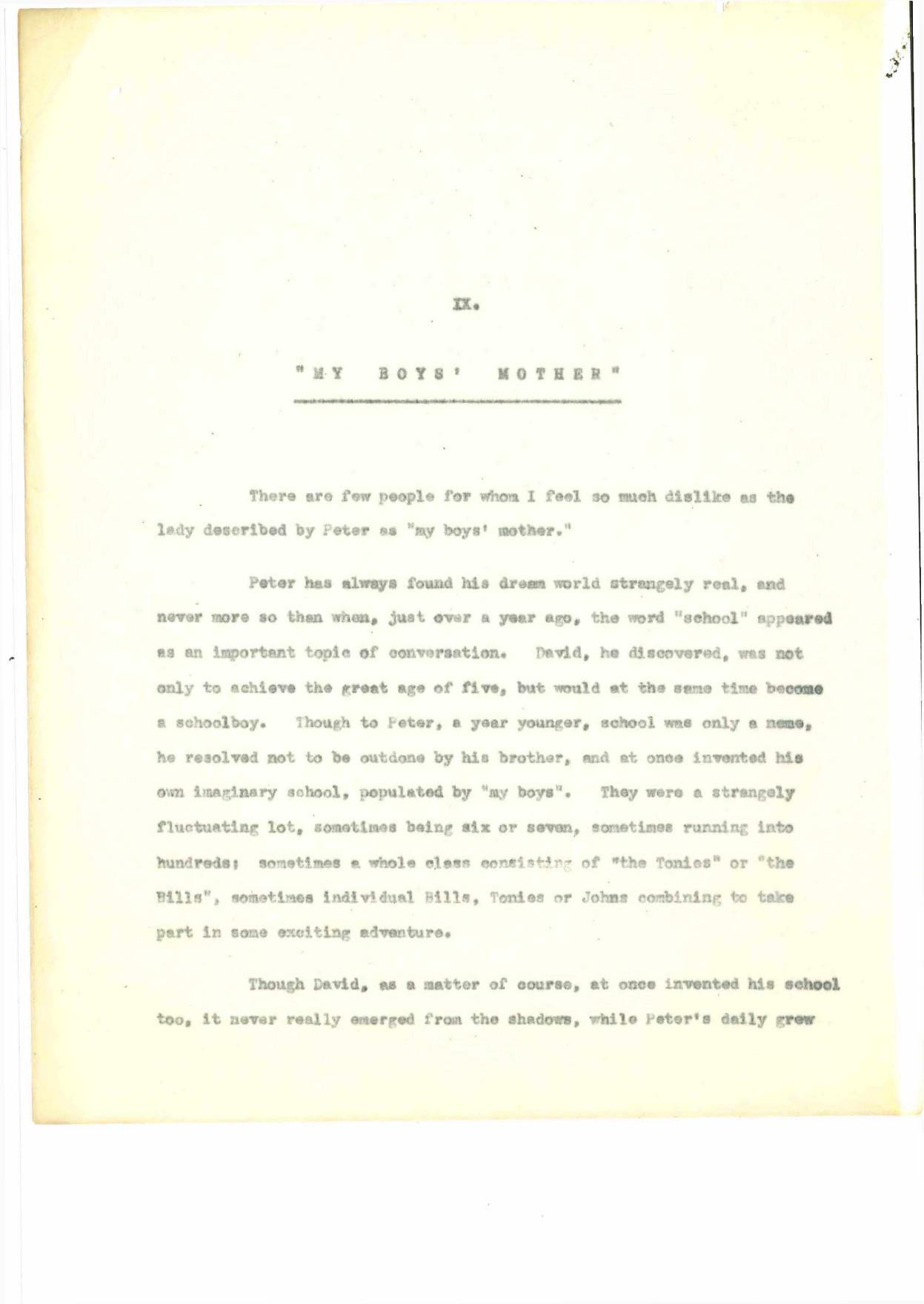The Doings of David and Peter
IX 'MY BOYS' MOTHER

There are few people for whom I feel so much dislike as the ' lady described by Peter as “my boys' mother."
Peter has always found his dream world strangely real, and never more so then when, just over a yeer ago, the word “school" appeared as an important topic of conversation. David, he discovered, was not only to achieve the great age of five, but would at the same time become schoolboy. Though to Peter, a year younger, school was only a name, he resolved not to be outdone by his brother, and at once invented his own imaginary school, populated by “my boys". They were a strangely fluctuating lot, sometimes being six or seven, sometimes running into hundreds; sometimes a whole class consisting: of "the Tonies” or “the Bills", sometimes individual Bills, Tonies or Johns combining to take ‘part in some exciting adventures.
Though David, as a matter of course, at once invented his school too, it never really emerged from the shadows, while Peter's daily, grew clearer and clearer. It was, he explained, situated "in High Street"; he showed, on the sign-post over the way, the arm which pointed to the direction of his school, and described, with much waving of arms, the intricate journey necessary to reach it. He entered into details of its fittings and colour-scheme, and the wonders of its play-ground, in which a real railway operated, driven by “the Tonies". Lessons, strange to say, played no part in this cheerful school, while railways and engines were all important.
Then David departed to school, and Peter, lost and lonely, consoled himself with the greater splendours of his school, his highly coloured descriptions leading to endless arguments with David.
But the imaginary school, and the companionship of the vague company called “my boys" could not satisfy one who had played every game, done every action, as part of a pair. When, therefore, it was proposed hesitatingly, that he might anticipate his fifth birthday by some nine months and accompany David to a real school, he accepted the idea with joy. The delights of real school made the imaginary one fade into the background, but the boys remained, and, since it became now necessary for them to have a home as well, “my boys’ mother" made her appearance.
There can never have deen a more efficient housewife and mother than this lady, for she had a positive genius for doing everything at least one degree better than I could. Was there a pink-tinted pudding for dinner? Then, Peter would announce cheerfully:
“My boys' mother makes pink puddings, but she puts cream on them.”
Were there cakes with cherries; Then: "My boys’ mother would have put cherries and icing."
Did I bring home a new jam-dish? Then: "My boys’ mother would have bought three, and put out three sorts of jam." Her china had roses, where mine were plain; the play-room she provided for her boys was decorated in a new and enchanting scheme, whereas David's and Peter's still bore the paper adorned with their early scribbles.
Day after day, the lady developed fresh virtues, till I began to dread the mention of her, knowing how badly I showed up in comparison.
Even my moment of triumph was spoilt. When, in pride, I introduced the two boys to a brand-new baby brother, I found that I had only come second-best again.
"My boys' mother had a baby too," said Peter casually. “She had. two babies -- twins."
“What a handful!" I said I, commiseratingly. “However many has she by now?"
"Oh, a thousand," said Peter. ‘A thousand boys."
“How does she manage?"
"Oh, she just has lots of houses all together, and when she makes dinner, she makes about a hundred puddings." (It was all apparently perfectly simple, and my fuss about one additional baby most unnecessary.)
Once or twice I at enquired about the the twins’ progress, and found that they were no trouble at all, and the nine hundred and ninety~eight other boys still weighed lightly on the shoulders of the amazing woman. But suddenly my dislike was tinged with pity, for trouble came on her like a storm. A casual reference to the family revealed the tragedy.
"A thousand boys!" said Peter. "Oh, she hasn't got a thousand boys now. She's only got a hundred."
“A hundred! But what became of all the rest?" "They just got old and died," was the calm answer. “All ‘cept a hundred that's all she's got left."
So, as at any minute another wave of old age may sweep away the last hundred of her family, I feel that, notwithstanding her perfections, I would not change places with "my boys' mother". Rather David, Peter and Michael alive and well than to have "had a thousand and buried nine hundred."


